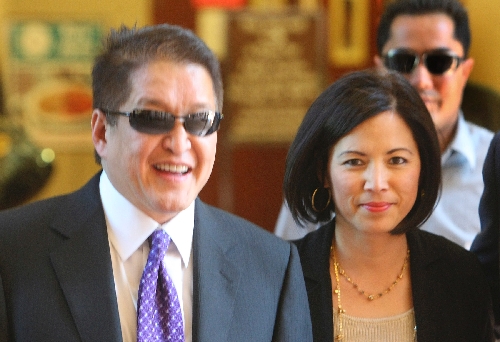Prosecutors in case against high roller criticized

The lead lawyer for indicted high roller Terrance Watanabe accused the district attorney’s office on Friday of reneging on a deal to dismiss criminal theft charges against Watanabe for failing to pay a $14.7 million gambling debt to Harrah’s Entertainment.
Los Angeles attorney Pierce O’Donnell later filed court papers challenging the constitutionality of the system the district attorney has set up under state law to prosecute gambling debts as bad checks.
At a morning hearing in the criminal case, O’Donnell told District Judge Donald Mosley that he was led to believe that prosecutors were going to announce Friday that they would dismiss the charges.
But Assistant District Attorney Chris Owens, the No. 2 person in the office, told the judge discussions "took a turn to the south recently, and we’re not in a position to make that determination at this time."
That angered O’Donnell, who said he came to court prepared to file his own motions to dismiss the charges against Watanabe, if needed. The motions, which were filed late in the afternoon, included one challenging the creation of the district attorney’s bad check unit, which prosecutes gambling debts and takes a percentage of the restitution for itself.
After the hearing, O’Donnell said Chief Deputy District Attorney Bernie Zadrowski, who runs the bad check unit, told both Mosley and him in the judge’s chambers June 1 that he was going to drop the charges.
"They told us point blank that ethically they had to dismiss the case because there was no evidence of a specific intent to defraud the casinos when he signed the markers," O’Donnell said. "He had millions of dollars in two bank accounts that was available to Harrah’s."
But Owens afterward denied that his office was going back on its word.
"We’re at an impasse," Owens said. "We haven’t gotten the records we need from the defense. What we got was less than what they said they had."
Owens added, "We have never come to a point in this case where we thought we didn’t have enough evidence to proceed."
In the past three months, prosecutors have met with O’Donnell and Harrah’s officials in an effort to determine whether the case can be resolved before its scheduled July 12 trial.
Watanabe, a 53-year-old Nebraska philanthropist, is charged with failing to pay the $14.7 million in markers at Caesars Palace and the Rio during an epic gambling binge in the final months of 2007. His lawyers have claimed in court papers that he lost a whopping $189 million at the Harrah’s casinos in 2007, making him one of the biggest "whales" of all time on the Strip, according to gaming experts.
Watanabe has alleged that Harrah’s Entertainment unlawfully encouraged him to gamble away tens of millions of dollars by keeping him in a constant state of intoxication. He contends employees at Caesars Palace and Rio supplied him with a steady flow of alcohol and prescription painkillers, as his gambling losses piled up.
Harrah’s, which asked the district attorney to prosecute Watanabe, has denied the allegations.
In his motion challenging the way the district attorney’s office prosecutes gambling debt cases, O’Donnell said the office has an inherent conflict that impinges on the due process rights of the defendants because it gets a percentage "off the top" of all restitution made in those cases.
Had Watanabe agreed to make restitution to Harrah’s under a diversion program run by the bad check unit, the district attorney’s office, by state law, stood to earn a 10 percent fee of nearly $1.5 million, O’Donnell wrote.
That fee would have been more than 34 percent of all the money the bad check unit collected in fees last year, O’Donnell added.
"The district attorney’s office has a substantial financial interest in the prosecution of Mr. Watanabe, and this appearance of bias is itself an unconstitutional denial of due process," O’Donnell wrote. "A public prosecutor cannot constitutionally serve as a … collection agency and dispassionate advocate."
O’Donnell wants Mosley to disqualify the district attorney’s office from the case because of that conflict.
In another motion seeking to dismiss the charges, O’Donnell stated that Watanabe had plenty of money in his bank accounts at the time the markers were executed and that he had given Harrah’s permission to gain access to that money.
As a result, it is impossible for prosecutors to establish that he committed a crime, O’Donnell wrote.
Contact Jeff German at jgerman@reviewjournal.com or 702-380-8135 or read more courts coverage at lvlegalnews.com.